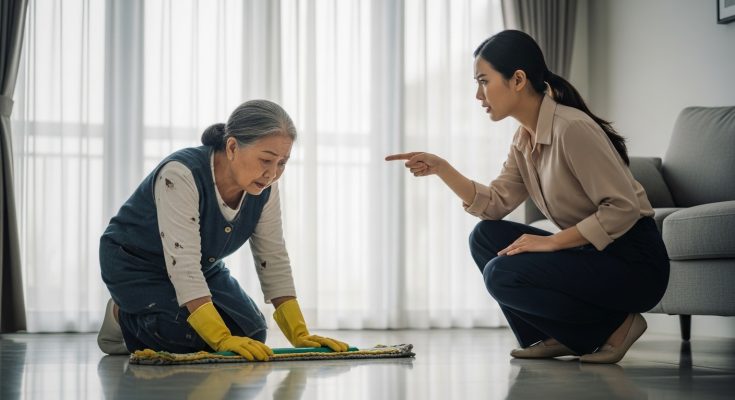Those words came out of the mouth of Carolina, my middle daughter, after I had spent more than 10 hours cleaning every corner of her house as if it were a sanctuary.
My name is María Elena, I am 67 years old, and I will never forget that Saturday morning, which even now, two years later, still makes my heart bleed every time I remember it.
You have to understand something about me. I have always been a hardworking woman, the kind who never knows rest. I raised five children on my own after my husband Ramón died in a work accident 25 years ago. I worked as a domestic helper in the houses of wealthy families in the Providencia neighborhood. I washed other people’s clothes. I sold food outside the San Francisco Church. I did everything so that my children would lack nothing.
My hands became full of calluses from so much work. My back bent from carrying heavy loads, but I never complained. I did it all for their future, for the dream of seeing them grow and move forward. Carolina was always different from the others. From childhood, she showed an intelligence that filled me with pride, but also a coldness that worried me.
She studied business administration at the University of Guadalajara, got a good job at a foreign company, and married Fernando, an engineer with a good salary. They have a beautiful house in the Las Águilas subdivision, two cars in the garage, and a life I never imagined a daughter of mine could have.
I always believed I had done my job as a mother well, that my sacrifices had been worth it. But that Saturday in March I discovered I had been completely wrong. Carolina called me crying, saying she desperately needed my help. She told me she was going to host Fernando’s family for an important lunch and that the housekeeper hadn’t shown up.
She was in a panic because the house was a mess after remodeling. Without a second thought, I canceled my plans—I was going to visit my friend Lupita, who was in the hospital—and rushed to help my daughter. I took three buses to get there, carrying with me my cleaning supplies and all a mother.
I never imagined that would be the day my heart would break into a thousand pieces, the day I would discover I had raised a serpent instead of a daughter.
I arrived at Carolina’s house at 7 in the morning. It was still dark, and the cool March air in Guadalajara felt refreshing. She greeted me at the door already dressed in a pink silk robe, her hair pulled into a perfect bun, nails manicured, makeup flawless—she looked like a porcelain doll, beautiful but cold.
She barely hugged me, with little warmth, and immediately began showing me the list of tasks to be done. Holy Mother of God, what a long list. Six handwritten pages in tiny letters, detailing every corner of the house that had to be cleaned. Their home is enormous, dear ones: four bedrooms, three bathrooms, a living room, a dining room, a modern kitchen, a service area, a garage, and a backyard garden with a fountain that Fernando boasts about.
All very pretty, very modern. But that day was a true disaster, thanks to the remodeling of the master bedroom—plaster dust everywhere, paint stains on the walls, tools scattered about, and furniture displaced. It was a task for the whole team, but there I was, a 67-year-old woman, ready to do it all alone out of love for my daughter.

I started with the kitchen, where the construction workers had left the most dirt. I emptied every drawer and cabinet, cleaned them one by one, washed the piles of dishes in the sink, and scrubbed the industrial stove she insists on having, even though she doesn’t cook well.
Then I moved to the bathrooms, my biggest challenge. The master bathroom had paint splatters on the walls, the mirror, and even on the toilet. I spent two hours in that bathroom alone, scrubbing every tile with a little brush until it sparkled like new.
Carolina would pass by me now and then, always rushed, always complaining—that I was using the wrong product, that I forgot to clean behind the door, that the windows still had streaks. But I swallowed the criticism and kept working, understanding that she was nervous about the important visit.
Fernando didn’t appear all morning. He had gone off early to play golf with his friends, leaving the responsibility to me and her—or rather, just to me, since she spent the whole time on the phone, organizing the menu with the catering service.
By midday, my legs were trembling with exhaustion. And then Carolina uttered those cruel words that I will never erase from my memory:
“You’re not even good enough to clean bathrooms. Any maid would do it better and faster than you.”
My back hurt as if it had been split in two, yet I was only halfway done with the work. The bedrooms, the living room, and that garden—which looked more like a jungle from how neglected it was—were still left. The midday sun in Guadalajara was merciless, and I felt like I was melting as I continued with my labor. Carolina had gone out to buy some last-minute items for the meal, leaving me alone in that enormous house with an endless list of chores.
My knees hurt so much that I had to lean on the broom several times just to stay standing. But a mother’s love is stronger than any pain, my dears. And I kept going. I moved on to the bedrooms, starting with the guest room. I changed all the bed linens, vacuumed the Persian carpet she insists on having, and cleaned the furniture piece by piece with a damp cloth.
In the master bedroom, the situation was even worse. The remodeling had left a fine layer of dust on everything—curtains, lamps, even inside the closets. I had to take out all the clothes, clean the drawers inside and out, and put everything back. All of them were expensive garments—designer dresses that cost more than three months of my salary back when I was still working.
By 2 in the afternoon, when the sun was at its peak, I went out to the garden. That same garden that had once been my pride when I helped design it was now abandoned. The roses I had planted with so much love were wilted, the grass overgrown, dry leaves scattered everywhere. I grabbed the hose and began watering. Then I cut the grass with scissors because the lawnmower was broken.
I gathered all the leaves into bags, trimmed the bushes, cleaned the fountain that was filled with green water and a terrible stench. Carolina returned at 3, accompanied by Fernando, who finally decided to show up. They carried several bags of expensive purchases—imported wines, fine cheeses, and flowers for the arrangements.
She saw me in the garden, sweaty and dirty, and only waved at me from afar, as if I were just another worker. Fernando didn’t even say a word to me, only muttered something about how noisy the hose was. That was when I noticed something that broke my heart. They were ashamed of me—ashamed of the woman who had given everything so that she could live that life of comfort.
I saw disguised contempt in Fernando’s eyes and in Carolina’s an impatience that hurt more than any direct insult. At 4 in the afternoon I still had so much left to do. The living room needed a deep cleaning. The window glass was fogged. The marble floor needed to be polished.
My arms hurt so much that I could barely lift the bucket, but I knew I couldn’t give up. The guests would arrive at 6, and my daughter was counting on me. Or at least that’s what I thought. At 5, as I was giving the final touches to the dining room—rearranging the chairs for the third time because Carolina wasn’t satisfied with their alignment—I heard voices at the entrance.
They were her friends who had arrived early to help with the final preparations. I recognized the voices of Paloma and Cristina, two women from the high society of Guadalajara, who always treated my daughter like a princess. Carolina greeted them with those fake kisses, full of drama and forced smiles. I heard Paloma ask who had cleaned the house because it looked impeccable.

My heart filled with pride for a moment, thinking that finally my daughter would recognize my effort, that she would introduce me as her hardworking mother, who had always been her example of strength and determination. But what I heard next tore a wound in my heart. Carolina, with a dismissive laugh, replied that she had hired a very good cleaning company, but unfortunately, the team was made up of older, simple people who did their job well, but without much sophistication.
She said she was thinking of changing to a more modern company with more presentable employees. And things got worse when Cristina commented that upon arriving, she had seen an older lady in the garden and asked if she was part of the cleaning staff. Without even hesitating, Carolina confirmed that yes, and even added that sometimes those humble people didn’t quite understand instructions, and that they had to be supervised constantly to make sure they did things properly.
My dears, in that moment, I felt like I couldn’t breathe. My own daughter was denying me, lying about who I was, treating me as if I were a stranger. I, who had spent 10 hours cleaning every inch of that house, who canceled my plans to help her, who ignored my own pain and exhaustion out of love for her, was now hidden in the kitchen, listening to their conversation.
They talked about their husbands, expensive trips, private schools for their children, and renovations in their homes. Carolina pretended to live an even more luxurious life than she really did, inventing stories about live-in maids, gardeners, and chauffeurs. It was as if she lived in a fantasy, and I was an obstacle to making that fantasy real.
When Fernando arrived with the other guests—well-dressed businessmen and their elegant wives—the situation became even more uncomfortable. Carolina signaled for me to stay in the kitchen, out of sight. She was ashamed of me—ashamed of the woman who gave her life, who worked day and night so she could study and have everything she had.
It was nearly 8 at night when I finally finished everything. The house was spotless, shining like a palace. The guests were in the dining room laughing and chatting, unaware of the sacrifice an old mother had made so that evening could be perfect. I was exhausted, with dirty clothes, messy hair, and hands raw from so much scrubbing and cleaning.
I approached Carolina to say goodbye and ask for her blessing, as I always did. She was radiant, laughing at some joke Fernando had told, holding a glass of wine that surely cost more than my monthly pension. When I discreetly whispered that I had finished everything and was leaving, she turned to me with an expression I will never forget.
It was pure disdain, anger, as if my presence was an unbearable nuisance. And then came the words that shattered my heart into a thousand pieces:
“You took too long to do such a simple job. Honestly, you’re not even good enough to clean bathrooms. Any maid would do it better and faster than you. I’m seriously thinking it would have been better to hire someone real instead of putting up with you all day, complaining and playing the victim.”
The world stopped at that instant. The laughter from the dining room sounded far away. The smell of expensive food made me nauseous. The lights in the house seemed to lose their brightness. I looked into my daughter’s eyes and saw a stranger, a soulless woman, someone who had completely lost all humanity and gratitude.
I didn’t answer. I just grabbed my old bag, my cleaning supplies, and walked out of that house without looking back. I walked to the bus stop with tears streaming down my cheeks, feeling that that day I had buried a daughter. On the way back to my humble little house in the San Juan de Dios neighborhood, I had time to think, to process all that pain.
But do you know what happened afterward? That pain, as terrible as it was, set me free. It made me realize that I had spent my whole life trying to please ungrateful children, sacrificing my own dignity. Today, two years later, I live for myself. I take care of my garden, visit my friends, go to church, and help in the community.
Carolina has called me a few times, but never to apologize. Always because she needs something. I learned that a mother’s love should not be confused with humiliation, that respect is earned, not begged for, and that sometimes losing an ungrateful child is actually reclaiming your own life.
This is my story, my dears—a story of pain, but also of rebirth.



